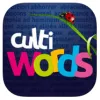Take a look inside 4 images
Cultiwords
Pros: High interest anecdotes make learning words easy and meaningful.
Cons: No user accounts for multiple students; no auditory word pronounciations.
Bottom Line: Excellent method for learning vocab teaches good study technique, too.
Cultiwords is great for individual daily vocabulary practice. In a 1:1 or bring-your-own-device (BYOD) environment, teachers could have kids memorize a new word daily and work through their review words as a warm-up, daily activity, or homework. Teacher could also introduce a word-a-day using Cultiwords on screen with the whole class working through the memorization and review together.
Cultiwords uses repetition and memory techniques to help students learn and remember 40 SAT-caliber vocabulary words. Extension packs of word collections can be added for $.99 each. Students start by attempting to identify the word, then reviewing the definition, which includes phonetic pronunciation, etymology, definition, and anecdotes about the word. At that point, they can choose to forget the word (and learn it at another time), add it to their dictionary, or share it on Facebook. Once the word is added to the dictionary, kids review the word, along with others in the dictionary, until they have identified it correctly three times. Then the word is "acquired" and moved to the acquired list in the dictionary. The dictionary shows the list of words "in process of acquisition" and words "acquired." Students can only review the words once per day, and are reminded with push notification.
With just a few minutes a day, students can dramatically improve their vocabularies using the process of memorization and review. The definitions go beyond the meaning of the wordby giving a colorful narrative of the word's origin and meaning, making it more likely to be remembered. Phonetic information is included in the definitions, but there's no option to hear the words pronounced, which would be a nice feature. The words included in the base set are: austerity, avuncular, back judge, cajole, caustic, colloquial, deplorable, eloquent, eros, gorgon, grouse, hiatus, irate, julienne, kismet, largess, meticulous, officious, paragon, phoneme, phytochemical, plaudit, precocious, quisling, quixotic, repugnant, salubrious, spurious, sultry, ubiquitous, and unctuous.












